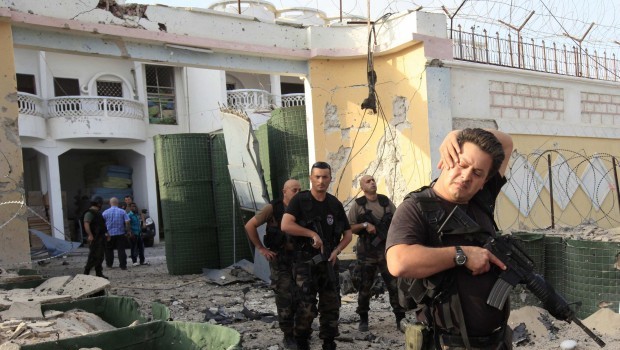Had the latest attack that targeted the Turkish embassy in the Somali capital of Mogadishu achieved its desired damage, losses would have been far higher than they were. The vigilance of the guards, who killed some of the attackers before they could detonate their explosives, prevented their plan to take out Turkish diplomats and security figures. It would have been the largest such attack to date.
The Al-Qaeda-affiliated Al-Shabab movement released a statement claiming responsibility for the attack. In it, the group justified targeting Turkey because its policy of “supporting the apostate regime [in Somalia] and seeking to suppress the Shari’a order.”
We were about to accept this scenario, which is considered logical given that Turkey—especially over the last five years—has increased its reconstruction, development and humanitarian projects, which extend far beyond Somali borders. Turkish embassies have become active missions that work around the clock to block such organizations from finding supporters, according to the Turkish foreign minister Ahmet Davutoğlu.
We were also about to believe that the attack was the price paid by Turkey and many other countries for going to Somalia and trying to provide peace between warring groups and end the lengthy civil war. These countries, however, abandoned Somalia amid a political and security vacuum, competing to take a piece of the African pie under international cover and direct intervention of the regional and international organizations as well as military and security presence there.
However, Ankara’s direct accusations of international powers infuriated by Turkey’s involvement in Somalia—an activity that has reversed the traditional considerations in the horn of Africa—have directed attention towards another scenario. This scenario is directly related to new regional players in this region.
In fact, this region contains the world’s most strategic waterways and perhaps what adds to its value and importance is the discovery of oil and precious metals. Davutoglu’s statements regarding the role played by some international powers in the attack leads us to a new conviction about the attack and the reasons behind it. In fact, it prompted us to entertain a number of possibilities, by viewing the attack as an attempt on the part of some sides—whose influence has receded and interests threatened by Turkey—to settle scores with Ankara.
Turkish political and security analysts dramatically took us back to the starting line by talking about those responsible and their interests in carrying out such an attack. This time, we were told that internal and external forces were conspiring against Erdoğan’s government and wanted to exclude Islamists from power. This was in the framework of a comprehensive plan, that had been developed, funded, and then carried out by Al-Shabab for the conspirators’ advantage.
A few days ago, the Greek Navy intercepted an inflatable boat transporting weapons and explosives to Turkey. Those detained confessed to preparing a campaign of assassinations of senior politicians and officials. This strengthened the argument that forces inside and outside of Turkey were behind the Mogadishu plot.
But the most likely possibility remains that Turkey is paying the price for changing its policy and attitudes towards extremist organizations that have obtained services and facilities, disregarding the movements on the Syria-Turkey border. Ankara and its allies are involved in more than politics and diplomacy with those that are against them. These forces wanted to warn Erdoğan’s government from any attempts to block their important supplies, and that any attempt to make new alliances in Syria should take them into consideration.
The message from Mogadishu reminded Turks of the bombings in Istanbul nearly a decade ago, carried out by Al-Qaeda. It also reminded them that Ankara cannot trust or be involved with these groups, which refuse partnership with any party unless it sets the terms and conditions. Moreover, that Salih Muslim Muhammed, the secretary-general of the Democratic Union Party, and Turkey’s arch enemy, has been welcomed by Syria will not be accepted even if Ankara had to prioritize fighting Kurds in Syria over fighting the Syrian regime.

Regrettable to see terrorism and criminality around stories of business and economical interests. While for Turkey patriotism, internationalism and nationalism are synonyms in that area of the world because of the theory of the motherland, its people and languages, for others, this question is not known. Therefore, one should thank the author of this note for his valuable analysis.